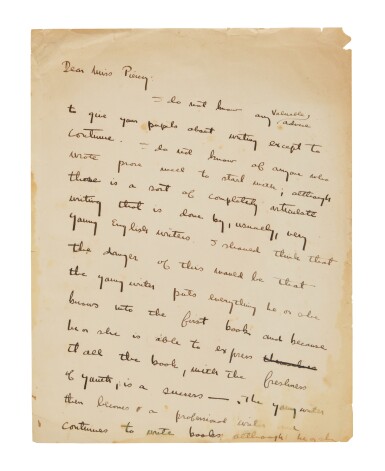Important Modern Literature from the Library of an American Filmmaker
Important Modern Literature from the Library of an American Filmmaker

Hemingway, Ernest | Autograph letter draft, about the principles of good writing; "I wrote a book called The Sun Also Rises in six weeks"
Lot Closed
December 8, 05:24 PM GMT
Estimate
20,000 - 30,000 USD
Lot Details
Description
Hemingway, Ernest
Autograph letter draft, to Josephine Ketcham Piercy, an instructor in the English Department at Indiana University, responding to her request for advice for her students about the principles of good writing
3 pages (280 x 217 mm) on 3 leaves of poor-quality typing paper, numbered [1-] 3, [Key West, ca. after 23 January 1929]; lightly browned, some marginal dampstaining and chipping, second page about 50 mm short at bottom, likely the result of Hemingway tearing away a rejected passage.
Josephine Ketcham Piercy was on the faculty of the English Department at Indiana University from 1926 until 1966. In 1929 she and Hemingway corresponded about his possibly contributing to the anthology she was compiling, Modern Writers at Work (New York: Macmillan, 1930), which collected samples illustrating the writing process, with commentaries, from authors including, in addition to Hemingway, Sherwood Anderson, Edith Wharton, Thornton Wilder, and Virginia Woolf. The present draft represents Hemingway’s initial response to her inquiry.
"I do not know any valuable advice to give your pupils about writing except to continue. I do not know of anyone who wrote prose well to start with; although there is a sort of completely articulate writing that is done by, usually, very young English writers. I should think that the danger of this would be that the young writer puts everything he or she knows into the first book and because he or she is able to express themselves it all the book, with the freshness of youth, is a success—. The young writer then becomes a professional writer and continues to write books although he or she never sees or learns anything more; being too busy writing to have anything happen to himself or herself. So perhaps it is good that it is usually very hard to learn to write.
"About practical advice; the only practical advice that I know is to write with pen or pencil and try to have each sentence make sense, to yourself at least. If it makes sense to you, and you are honest, it will eventually make sense to some one else. If you write by hand you will write slower.
"Some things are written at great speed but they need to be gone over slowly."
Hemingway then describes a personal experience with writing something "at great speed": "I wrote a book called The Sun Also Rises in six weeks—starting it on my birthday the 21st of July [1925] in Madrid and continuing on the train to Valencia, in Valencia each day during a week of bullfights, on the train again to Madrid, on the train to Hendaye, in a hotel there and finishing it the 6th of September in Paris. I did not look at it again until I re-wrote the first half of it in Austria in December. Took a trip to N.Y. and re-wrote the last half when I came back. The re-writing took six weeks. I was never satisfied with the book but could do nothing more about it. Two short stories The Killers and Today Is Friday I wrote on two summer days in Madrid during the 15th of May of one year [1926] when there was a snow storm and the bullfights were called off[.]"
A final version of this letter was sent to Piercy, along with a manuscript page of A Farewell to Arms, which Hemingway described as "an attempt to get a sentence right"; the letter and manuscript are both at the Lilly Library (Hanneman F19 & F73). Hemingway told Piercy that she could "use any story of mine you want," and she included "Cat in the Rain" in Modern Writers at Work, together with a long excerpt from the letter she received. The sent letter is quite different from the present draft, not mentioning the writing of The Sun Also Rises nor the two stories and with a number of revisions and changes of emphases—for instance, the draft endorses writing by hand, while the sent letter excoriates the typewriter.
The present draft (and the final letter) are dated by the editors of The Letters of Ernest Hemingway on the basis of his having cancelled in the final letter the comment that he has been "finishing the rewriting of book" as well as a reference to his "new book." This indicates that he wrote to Piercy after completing A Farewell to Arms, the revisions of which he completed on 22 January 1929, as he reported to other correspondents.
REFERENCE:
Letters, ed. Spanier, et al., 3:513-14; cf. 514-15 for the final letter as sent
PROVENANCE:
Antony Mason (Christie’s New York, 19 May 2000, lot 288)
